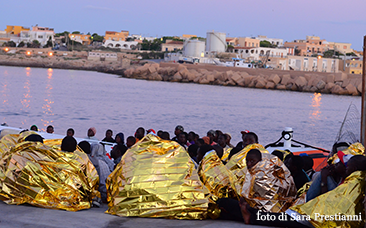Spain: Policing the Southern Border on EU’s behalf

By Peio Aierbe, SOS Racismo – SPAIN (February 2018)
In 2017, the number of migrant and refugee arrivals to Spain increased significantly, tripling in comparison to 2016 and reaching a total of 28,349 (UNHCR). 22,103 people arrived on boats (including 8% women), while 6,800 entered through Ceuta and Melilla. According to the Spanish Ministry of the Interior, 56.7% of them were Sub-Saharan Africans, 22.4% were Moroccans and 20.5% were Algerians. 223 individuals died at sea (IOM).
As of 1 October 2017, more than 23,000 asylum claims had been lodged. This represents the highest number of asylum seekers in Spain in 33 years. In all of 2016, 15,755 asylum claims were registered. This increase represents 13% of all arrivals to Europe, in comparison with 2% the previous year. Two main reasons account for this situation. First, other migration routes were closed through bilateral and EU agreements with Turkey, Libya, and other African countries. Second, the situation in Morocco has worsened. The authorities have cracked down on immigration by dismantling Sub-Saharan migrants’ camps, which led many to continue their journey across the sea or to attempt to jump over the fences of Ceuta and Melilla. Morocco has also been experiencing a critical situation, with many protest movements being harshly suppressed. Lastly, Morocco has loosened border surveillance on its northern coasts as a form of blackmail in reaction to a year-old ECJ decision which declared Western Sahara separate from Morocco.
In response, the Spanish government has continued to conduct summary push-backs from Ceuta and Melilla, despite a decision rendered on 3 October 2017 by the ECtHR, which considered these a gross violation of the prohibition of collective deportations, a principle contained in international treaties ratified by Spain. Courts have fostered an atmosphere of impunity among the security forces. The most recent example of this is the Tarajal case, which involved the death of 15 migrants on the Tarajal beach in Ceuta as a result of the actions of the Spanish Civil Guard. The criminal investigation, which had been opened in 2014 upon “popular accusation”, was closed on January 28.
Among its initiatives to fight against police brutality, SOS Racismo developed the campaign “ Stop Stopping Me ” against ethnic profiling in identity checks. We have also witnessed great hostility towards those supporting immigrants and refugees at risk. The Spanish and Moroccan administrations have worked hand in hand on this. On January 31, Helena Maleno, a well-known human rights defender, testified in Tanger on allegations of human trafficking. The recent use of the prison of Archidona (Malaga) to detain 500 immigrants and refugees upon their arrival by sea in November was the last in a long series of illegal measures, since using penitentiary facilities for this purpose is prohibited. The protest staged by detainees was repressed by the riot police and one person committed suicide in December. At least eight people have died in Spanish internment centers.
The position of the Spanish administration can be summed up in a statement of a government delegate in Murcia, who referred to boat arrivals as an “attack on the EU”. In response, SOS Racismo monitors xenophobic discourse in the media, assists with filing complaints against discrimination and documents the situation of racism in Spain. In the end, while Spanish policies of control and deportation were once criticized in the EU, they are now considered as an example to follow.